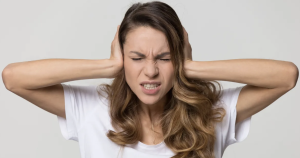September 2023
Researchers from Sussex University conducted a study to investigate why individuals with misophonia may pay excessive attention to misophonic sounds (e.g., lip smacking and chewing). They found that people with misophonia tend to exhibit heightened attention to detail, which means they are particularly good at noticing small things that others might miss. Additionally, they have cognitive inflexibility, which implies that they may have difficulty adapting to new situations or changing their thought patterns. Moreover, individuals with misophonia display vivid auditory imagery, meaning they can “hear” sounds in their minds with great clarity.

Image adopted from iflscience.com
In this study, they observed that those with more frequent aversive trigger sounds performed better in a task involving attention to detail. This suggests that the frequency of encountering irritating sounds is related to one’s ability to notice them. In simpler terms, individuals with better attention to detail are more likely to spot annoying sounds.
These traits are not unique to misophonia and can also be found in disorders or conditions like eating disorders, obsessive-compulsive disorder, depression, and perfectionism. This suggests that misophonia may share some similarities with these disorders or conditions.
Additionally, the researchers discovered that misophonia triggers, which are sounds that trigger irritation, are mildly aversive to everyone, not just those with misophonia. However, they become more aversive for individuals with misophonia. This suggests that the underlying dislike of these sounds is common to all, but misophonics experience more extreme emotional responses.
The researchers also found that people with misophonia have more vivid mental imagery of sounds. This heightened auditory imagery might contribute to their increased attention to sounds, making it harder for them to ignore irritating noises.
There are a couple of things to keep in mind about this study. First, they should think about how age might have affected the results. It could be interesting to see if being older or younger makes a difference in how people with Misophonia think and pay attention. To find out, future studies could make sure that the people they compare are close or matched in age. Second, they used a questionnaire called MQ (Misophonia Questionnaire) to figure out who had Misophonia, but this might not catch everyone with the disorder. Some people might be missed, especially when compared to a proper clinical interview. Also, they did not look into other disorders/conditions that often come along with Misophonia, like anxiety, depression, and hearing problems. So, it’s not clear if the differences they found in how people think and pay attention are only because of Misophonia or because of these other things too.
If you’re interested in learning more about how misophonia relates to audiological and psychological comorbidities, you can check out the research conducted at the Hashir International Specialist Clinics & Research Institute for Misophonia, Tinnitus, and Hyperacusis by visiting this link.
Overall, their research sheds light on the characteristics associated with misophonia, going beyond a simple aversion to certain sounds. It paves the way for further studies to understand the mechanisms behind misophonia and develop targeted interventions, providing new insights into the mental profiles of individuals with misophonia.
For more information, please refer to the projects of our students who are working on similar projects.
What to do if you have misophonia?
Misophonia is a real and highly debilitating disorder that can have a significant impact on individuals’ lives, and it can be challenging to manage without support. If you or someone you know is struggling with misophonia, it is essential to seek help from healthcare professionals who understand the disorder and can provide effective treatment options.
This review is written by Dr. Mercede Erfanian, PhD – research fellow at Hashir International Specialist Clinics & Research Institute for Misophonia, Tinnitus and Hyperacusis.
